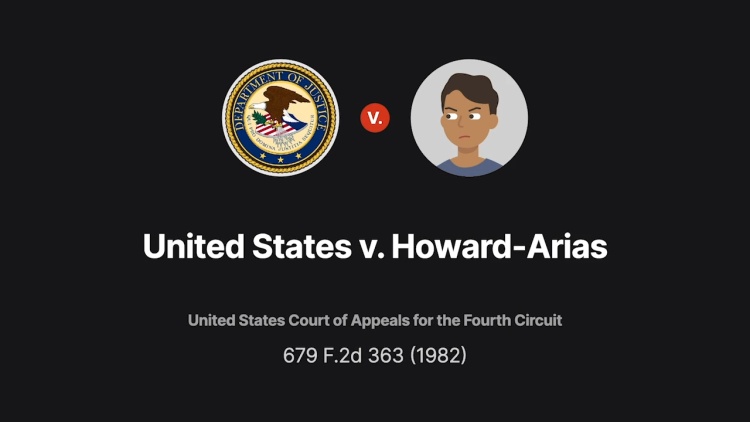United States v. Howard-Arias
United States Court of Appeals for the Fourth Circuit
679 F.2d 363 (1982)

- Written by Christine Raino, JD
Facts
The crew of a fishing trawler called the “Don Frank” was taken on board an Italian ship after the Don Frank became disabled off the coast of Virginia. When the Coast Guard arrived, an officer boarded the Don Frank and discovered marijuana. The Coast Guard attempted to tow the Don Frank to shore, but the Don Frank sank. The Coast Guard retrieved approximately 240 bales of marijuana from the sunken boat and at the port, turned over the marijuana bales to Drug Enforcement Agency (DEA) special agents. The United States (US) (plaintiff) charged Howard-Arias (defendant), a crewmember on the Don Frank, with possession of marijuana with intent to distribute while on a vessel within United States jurisdiction. At trial, the US introduced the marijuana into evidence through the testimony of the Coast Guard officer who seized and tested the marijuana, the officer to whom the initial Coast Guard officer surrendered the seized marijuana, the DEA custodian at Norfolk, and the DEA chemist. The DEA special agent at the port who received the marijuana for transportation to the DEA in Norfolk did not testify. Howard-Arias was convicted and appealed his conviction to the United States Court of Appeals for the Fourth Circuit, claiming that the marijuana should not have been admitted in evidence because the testimony failed to establish the chain of custody of the marijuana from the time of seizure until its introduction at trial.
Rule of Law
Issue
Holding and Reasoning (Kaufman, J.)
What to do next…
Here's why 899,000 law students have relied on our case briefs:
- Written by law professors and practitioners, not other law students. 47,000 briefs, keyed to 994 casebooks. Top-notch customer support.
- The right amount of information, includes the facts, issues, rule of law, holding and reasoning, and any concurrences and dissents.
- Access in your classes, works on your mobile and tablet. Massive library of related video lessons and high quality multiple-choice questions.
- Easy to use, uniform format for every case brief. Written in plain English, not in legalese. Our briefs summarize and simplify; they don’t just repeat the court’s language.





